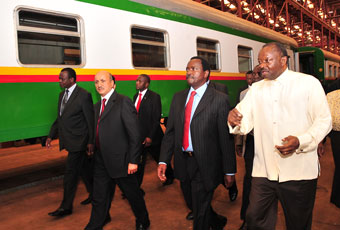
By Patrick Kagenda
Since the Tanzanian government terminated its contract with a rail concessionaire early this month, pressure has been mounting on Uganda to throw out non-performing Rift Valley Railways.
But Uganda`s Minister of State for Works John Byabagambi told The independent that the government is determined to throw it out but since RVR signed a concession with two countries, Uganda has to move together with Kenya.
“We can’t throw RVR out ourselves in spite of our resolve to do so because the train passes through Kenya,” said Byabagambi.
The new controversy is much more than a mere board room issue involving disagreements between shareholders. It is a high stakes affair with major political undercurrents mainly because of the perceived political clout of individual businessmen behind one of the shareholders in RVR, the Transcentury Group.
The issue was top of the agenda when a meeting of a joint inter-ministerial committee on which both Uganda and Kenya are represented assembled in Nairobi last week to discuss recent happenings in the railway concession.
The meeting was prompted after Roy Puffet’s Sheltam Group which is the majority shareholder in RVR sold its 49% shares to the Ambience Ventures Ltd of the Citadel group of Egypt. Sheltam did this in collaboration with the other shareholders excluding Transcentury.
Sheltam has a 35 % stake in RVR followed by Trancentury’s 20 %, Tanzania’s Mirambo Holdings 15%, Prime Fuels of Kenya 15%, Babcock Investments Holdings of Australia 10% and Centum Kenya Ltd 5%.
According to information disclosed in the prospectus which Transcentury put out as the company floated a private placement share floatation in 2008, among its top ten shareholders include the managing director of Ken Gen, Eddy Njoroge, the Commissioner General of Kenya Revenue Authority, Michael Waweru, and influential businessmen Peter Kanyago, Jimna Mbaru, Zaph Gitau Mbugua and Joe Karago.
Sources in Nairobi told The independent, RVR`s ejection is complicated by the fact that there are two political factions to it. Both Kenyan President Mwai Kibaki and his Prime Minister Raila Odinga have vested interest in the RVR.
“It’s the politics involved that is hindering the exit of the RVR,” the source in the Kenyan ministry of Transport told The Independent.
The majority of the shareholders of RVR apart from Transcentury have maintained that what had changed hands were only shares of Sheltam Ltd. They say that the entry of the Egyptians had no bearing on the initial ownership structure of RVR and that the Kenya and Uganda governments have no say in the matter.
There are also claims that a decision by the governments of Kenya and Uganda that Sheltam should quit and its place be taken over by a new company that would be known as the Kenya Uganda Railways (KUR) in which all the remaining shareholders would inject $ 50 million in proportion to the stakes in the company collapsed because the concession agreement granted the South Africans too much power vis avis the interests of the two country.
Sheltam managed to outwit its fellow shareholders in the new deal because the concession agreement had put total control of the board of the company in the hands of Sheltam and under the concession documents, Sheltam was granted the upper position of lead investor, guaranteeing the South African company a minimum shareholding of 35 % which was not to be diluted throughout the concession which meant that the remaining shareholders could not put any substantial amount ofmoney into the company as this would dilute Sheltam and breach the 35 % minimum rule.
The wealthy Egyptians have pledged to invest $150 million of fresh funds into RVR to offset outstanding concession fees to both the governments of Uganda and Kenya, and to pump money in the purchase of new locomotives and rehabilitation of the track.
With his hands apparently tied, Byabagambi says Uganda will continue pushing hard to see that RVR either is kicked out or it improves its performance. “We need to be optimistic and see how the Egyptians will perform”.
 The Independent Uganda: You get the Truth we Pay the Price
The Independent Uganda: You get the Truth we Pay the Price





